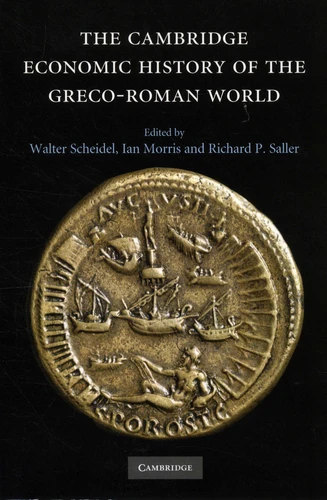The Cambridge Economic History of the Greco-Roman World
Par : , ,Formats :
- Réservation en ligne avec paiement en magasin :
- Indisponible pour réserver et payer en magasin
- Nombre de pages956
- PrésentationBroché
- FormatGrand Format
- Poids1.445 kg
- Dimensions15,2 cm × 23,0 cm × 5,6 cm
- ISBN978-1-107-67307-6
- EAN9781107673076
- Date de parution15/12/2014
- ÉditeurCambridge University Press
Résumé
In this, the first comprehensive one-volume survey of the economies of classical antiquity, twenty-eight chapters summarize the current state of scholarship in their specialised fields and sketch new directions for research. The approach taken is both thematic, with chapters on the underlying determinants of economic performance, and chronological, with coverage of the whole of the Greek and Roman worlds extending from the Aegean Bronze Age to Late Antiquity.
The contributors move beyond the substantivist—formalist debates that dominated twentieth-century scholarship and display a new interest in economic growth in antiquity. New methods for measuring economic development are explored, often combining textual and archaeological data that have previously been treated separately. Fully accessible to non-specialists, the volume represents a major advance in our understanding of the economic expansion that made the civilization of the classical Mediterranean world possible.
The contributors move beyond the substantivist—formalist debates that dominated twentieth-century scholarship and display a new interest in economic growth in antiquity. New methods for measuring economic development are explored, often combining textual and archaeological data that have previously been treated separately. Fully accessible to non-specialists, the volume represents a major advance in our understanding of the economic expansion that made the civilization of the classical Mediterranean world possible.
In this, the first comprehensive one-volume survey of the economies of classical antiquity, twenty-eight chapters summarize the current state of scholarship in their specialised fields and sketch new directions for research. The approach taken is both thematic, with chapters on the underlying determinants of economic performance, and chronological, with coverage of the whole of the Greek and Roman worlds extending from the Aegean Bronze Age to Late Antiquity.
The contributors move beyond the substantivist—formalist debates that dominated twentieth-century scholarship and display a new interest in economic growth in antiquity. New methods for measuring economic development are explored, often combining textual and archaeological data that have previously been treated separately. Fully accessible to non-specialists, the volume represents a major advance in our understanding of the economic expansion that made the civilization of the classical Mediterranean world possible.
The contributors move beyond the substantivist—formalist debates that dominated twentieth-century scholarship and display a new interest in economic growth in antiquity. New methods for measuring economic development are explored, often combining textual and archaeological data that have previously been treated separately. Fully accessible to non-specialists, the volume represents a major advance in our understanding of the economic expansion that made the civilization of the classical Mediterranean world possible.







